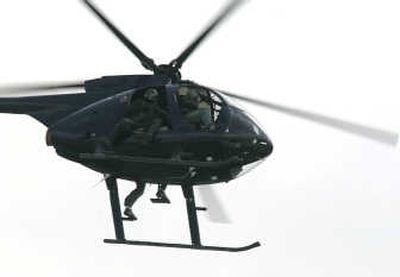Tensions escalate in Iraq

BAGHDAD – The U.S. Embassy ordered civilian government employees to remain inside the heavily protected Green Zone indefinitely as American and Iraqi officials debate the legal status of foreign security contractors following a weekend shooting incident in which eight civilians were reported killed.
The Iraqi government announced Tuesday that its initial investigation determined that Blackwater USA guards fired without provocation on Iraqi civilians Sunday at a Baghdad traffic circle. The account contradicted statements by the North Carolina-based security company and U.S. State Department that the guards had come under small-arms fire.
Iraqi authorities said they would move to overhaul laws to end the immunity of foreign contractors from prosecution in Iraqi courts, a procedure instituted by occupation officials after the 2003 U.S.-led invasion. The confrontation could prove a test of the sovereign powers of the Iraqi government when it clashes with American officials over subjects such as its dependence on private security contractors, whom many Iraqis loath after repeated episodes of wild shooting, reckless driving and abusive behavior.
Iraqi government spokesman Ali Dabbagh insisted Tuesday that Blackwater guards should be held accountable for Sunday’s killings, which took place while the security detail was assigned to protect a State Department motorcade.
“They should not have immunity for their mistakes,” Dabbagh said. “If they have made a mistake, they should be subjected to the law.”
With Iraqi public opinion inflamed by the deaths, including that of a young child, the U.S. Embassy issued a brief statement late Tuesday declaring the ban on civilian employees leaving the Green Zone – home to most American officials in Baghdad – or other areas of Iraq not guarded by the U.S. military.
Several American diplomats described the freeze, even if it proved short-lived, as a strong blow to the embassy’s work in Iraq.
“People have to get out. There is no point of having a diplomatic mission in a country if you don’t get out,” one U.S. diplomat said.
The freeze on travel came despite recent American military statements that attacks in Iraq were down as a result of the seven-month buildup of U.S. troops.
“This suspension is in effect in order to assess mission security and procedures, as well as to assess a possible increased threat to personnel traveling with security details outside the International Zone,” the statement said.
Embassy officials did not further explain the need for a freeze, nor did they address details of Sunday’s incident or the future role of Blackwater, which employs about 1,000 people in Iraq.
However, U.S. officials insisted they were in coordination with the Iraqi government on how to proceed. “We are pursuing discussions with the Iraqi government at the highest levels,” U.S. Embassy spokeswoman Mirembe Nantongo said. “Part of the discussions is what structure and form the investigation will take.”
U.S. officials said they were talking with the Iraqi government about what rules should henceforth guide the operations of contractors.
U.S. officials in Washington said that officials at the embassy had ordered the travel halt after consultation with senior officials in Washington. U.S. Ambassador Ryan Crocker was in London with Iraq commander Gen. David Petraeus on Tuesday discussing strategy with British officials, officials said.
Officials said they took the step out of “an abundance of caution,” as one put it, to avoid any complication at a time of heightened tensions. “It’s an emotional issue, on all sides,” one official said.
Iraqi spokesman Dabbagh said a preliminary report showed Blackwater guards “used superior firepower unnecessarily.”
Two survivors of the shooting told McClatchy Newspapers that the Blackwater guards opened fire without provocation.
Hassan Jaber Salma, 50, a lawyer who suffered eight gunshot wounds in the incident, said he and other motorists were attempting to clear a path for the convoy when the Blackwater guards strafed the line of traffic with gunfire.
Sami Hawas Karim, 42, a taxi driver who was shot in the hip and side, said he, too, had stopped for the convoy when he saw the guards suddenly open fire on a car bearing a man, woman and small child. The guards then opened fire on maintenance workers in the square, the car in front of him, the car behind him and a minibus full of girls.
When he felt the pain of his two wounds, he opened the door of his car and fell to the ground; his 13-year-old son in the car with him wasn’t harmed.
“I thought about my family and my five kids,” he said. “I remembered my two brothers who were killed, and I said to myself, ‘I’m going to be the third.’ “
Neither of the two survivors interviewed at Baghdad’s Yarmouk Hospital said he’d heard explosions or gunfire before the Blackwater guards opened fire on cars that had stopped to allow a four-vehicle convoy to pass.
A U.S. diplomat said frustration over the Americans’ failure to rein in the security companies had transformed Sunday’s shootings into a symbol of abuses committed over the years by the more than 20,000 foreign security guards that supplement U.S.-led military forces in Iraq.
Exploiting public rage over the killings, anti-American cleric Muqtada al-Sadr demanded that the government ban all foreign security contractors.
“This aggression would not have happened had it not been for the presence of the occupiers who brought these companies, most of whose members are criminals and ex-convicts in American and Western prisons,” al-Sadr said in a statement.
Al-Sadr insisted that the government of Prime Minister Nouri al-Maliki prosecute those involved and ensure that families of the victims receive compensation.